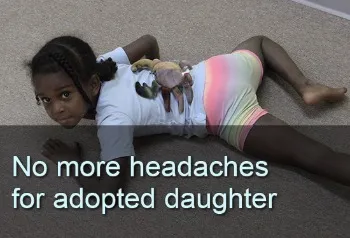Primitive Reflex Integration Case Studies
No More Headaches for Adopted Daughter
Innate rhythmic movements and reflex integration help with headaches, social-emotional skills, and potty training.
This pediatric occupational therapist, mother of two, and student of the Brain and Sensory Foundations First Level course was concerned about her daughter's developmental delay, neck pain and headaches, moodiness, and potty training. After practicing neurodevelopmental movements, her daughter quickly saw a reduction in headaches and neck pain. More work with these tools led to improved social-emotional skills and full potty training.
Submitted by N.K., Mother and Occupational Therapist

| Before | After |
|---|---|
| Complained of headaches | Fewer headaches |
| Would experience neck pain when working at the tabletop | Now able to flex her neck to work on tabletop tasks without having neck pain |
| Strong startle reaction | Less noticeable startle reaction |
| Would have strong emotional reactions if she said something funny and people laughed suddenly | Less reactive to people laughing, and is even beginning to laugh at herself |
| Would go into sullen moods over what seemed to be minor issues | More stable moods |
| Had difficulty with urinary incontinence during the day and at night | Urinary problems have resolved |
| Demonstrated very low frustration tolerance; would give up before even trying challenging tasks | More apt to persevere with difficult tasks |
I am a pediatric occupational therapist and the mother of two children who were adopted as infants with areas of concern. Annie is my 8-year-old daughter who has a variety of “invisible” issues in addition to her diagnosis of auditory processing disorder. Her milestones were achieved in the later stages of what was considered “typical” and never was a proficient roller. She scooted instead of crawled and would have major meltdowns if I tried to get her to crawl. She did not walk until she was 15 months old.
She was (and is) a happy child for the most part but would go into sullen moods and refuse to talk about what was going on over what appeared to be minor issues. When questioned, she would yell “I DON’T KNOW”. Additionally, she had a strong startle reaction and would have strong emotional reactions if she said something funny and people laughed suddenly or if she felt people were “yelling” at her. She also demonstrated very low frustration tolerance and would give up before even trying challenging tasks. Additionally, she had difficulty with urinary incontinence during the day and at night. Many times she seemed unaware that she was wet. Academically she struggles with math, multistep directions and needs more prompting to think things through. She was tested and showed average abilities but still struggled. She wears glasses and it was recommended that she begin vision therapy due to convergence and tracking issues. She complains of headaches and has overall higher muscle tone.
We started doing our exercises this summer under the cover of her “helping” mommy learn things to help her students. She enjoyed the 4 rhythmic movement positions [from the Brain and Sensory Foundations course] and would ask for them every night.
We noticed an increase in her emotional lability for about 3 weeks but pushed through. One thing that she mentioned right away was a reduction in headaches and being able to flex her neck to work on tabletop tasks without having neck pain. Once things were more stable emotionally we began to work on her Fear Paralysis and Moro because I felt that this was causing the biggest problem in her life.
Positive changes that I have noticed:
Less noticeable startle reaction (she is even beginning to laugh at herself). More stable moods.
Urinary problems have resolved.
Less headaches, neck tension and more fluid reading out loud
She is more apt to persevere with difficult tasks- most noticeable is wanting to use Hearbuilder software where she would refuse or cry after a few minutes of working with it previously.
Prior to a choir concert that she was performing in we did the 5 step balance process from the Brain and Sensory Foundations course. After our integrative movements, she reported feeling calmer and was able to sing along with what looked to be confidence during the concert.
I am pleased with her progress and think that she notices as she is very compliant with the activities.
[Edited for length and clarity; emphasis added]
*Disclaimer: The activities in the Brain and Sensory Foundations curriculum make use of the natural processes of neuroplasticity and development that are innately wired in the design of human beings to promote maturity and function. These activities appear to calm, organize, and mature the neuro-sensory-motor systems just as we see in the healthy development of human infants. Individual results may vary, and we do not claim to offer a diagnosis or cure for any specific condition or disorder. The Brain and Sensory Foundations activities appear to improve overall functioning resulting in measurable improvements for a range of conditions as demonstrated in over 1800 case studies from participants.

